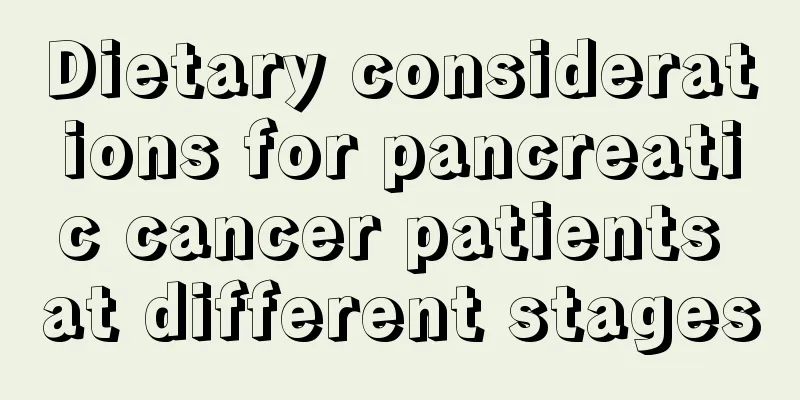Dietary considerations for pancreatic cancer patients at different stages

|
Pancreatic cancer is a dangerous malignant tumor. The annual incidence rate of pancreatic cancer in my country is 5.1/100,000. The incidence rate of pancreatic cancer in men in Shanghai is close to that in Europe and the United States. The prognosis of pancreatic cancer is poor. In order to maximize the patient's quality of life, patients need to pay special attention to their daily diet during recuperation to avoid increasing the burden on the pancreas. Early The symptoms of early pancreatic cancer patients are relatively mild, mainly digestive discomfort, such as nausea, poor appetite, aversion to oil, and steatorrhea. When eating a high-fat and high-protein diet or overeating, the pancreas is damaged and the symptoms of digestive disorders are aggravated. Therefore, patients should have regular meals, at regular times and quantitative amounts, and eat small meals frequently, 3 to 5 meals a day, otherwise it may cause the pancreas to continuously secrete pancreatic juice, increasing the burden on pancreatic function. The diet should be reasonably matched, and attention should be paid to the ratio of carbohydrates, fats and proteins. Carbohydrates should be the main food, and the amount of fat and protein should be appropriate. Proteins that are easy to digest and absorb should be consumed, such as lean meat, eggs and fish. Reasonable cooking methods should be used, such as boiling, stewing, simmering, steaming, and sautéing. Do not use frying, deep-frying, or stir-frying, so as to avoid excessive secretion of pancreatic juice due to excessive oil in the food. Middle and late stage When the disease develops to the middle and late stages, the patient's upper left abdominal pain worsens, and there is obvious weight loss and ascites. It is very difficult for the patient to eat orally, and it cannot meet the body's needs. At this time, intravenous nutrition is needed to improve the overall nutritional status. Patients who have not lost the opportunity for surgery should try to take active measures to remove the lesion through surgery. After the operation, the patient must not eat or drink for three days, and the body's physiological needs must be maintained through peripheral and central venous nutrition. After the gas is exhausted, the patient can eat some oil-free full-liquid food such as rice soup, fruit juice or vegetable juice to stimulate the digestive function of the gastrointestinal tract. After the gastrointestinal tract gradually adapts, the patient can gradually change to low-fat semi-liquid or low-fat food according to his appetite. |
<<: Health food therapy for lymphoma patients during chemotherapy
>>: Traditional Chinese medicine prescription to relieve the pain of gallbladder cancer
Recommend
Athlete's foot fungus is afraid of white vinegar
There is a difference between beriberi and athlet...
Bladder cancer tumor removal surgery cannot be rushed
Bladder cancer ranks fourth among the most common...
Internal Medicine Nursing for Endometrial Cancer
Endometrial cancer is a malignant tumor originati...
How to peel canned yellow peaches
Yellow peaches are a fruit that is more suitable ...
How much does it cost to treat cervical cancer in the early stages
Cervical cancer, when people hear these words, th...
What nursing measures are there for lung cancer patients? These nursing measures should be taken for lung cancer patients
Here I would like to suggest that all friends sho...
What are the best foods to eat when you have liver cancer? Three foods are essential for liver cancer patients
Liver cancer is a very serious disease. If people...
The hazards of stainless steel insulated lunch boxes
I believe that lunch boxes are a type of utensil ...
How to care for primary liver cancer? This is the best way to care for primary liver cancer
The harmfulness of primary liver cancer cannot be...
Exercise can secrete dopamine
Dopamine is not secreted during exercise under no...
How to match with long trench coat
People often like to wear windbreakers in autumn....
How long does it take for TSH to drop after hemisection of thyroid cancer
The time it takes for TSH (thyroid-stimulating ho...
What is primary brain lymphoma and what are the treatments?
What is primary brain lymphoma? What are the trea...
Taboos on eating carambola
Star fruit is one of my favorite fruits. Like app...
What to do if your hair sticks outwards
Many people pay much attention to their hair and ...









